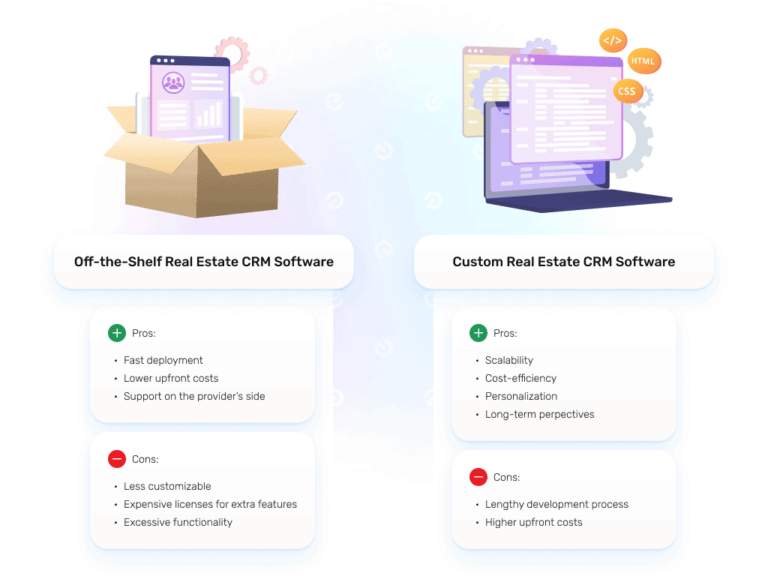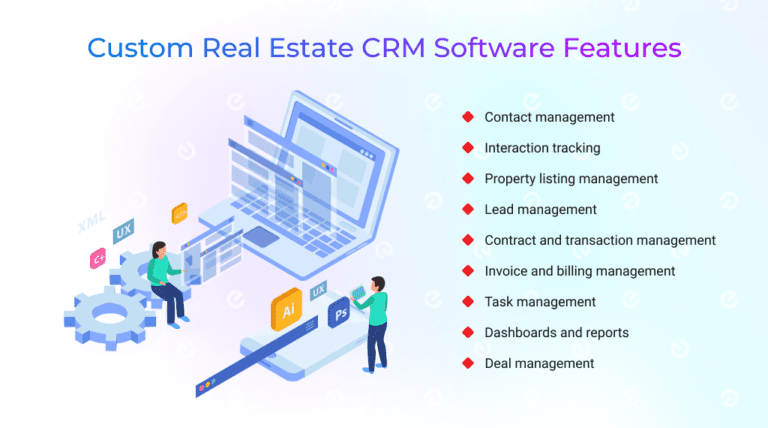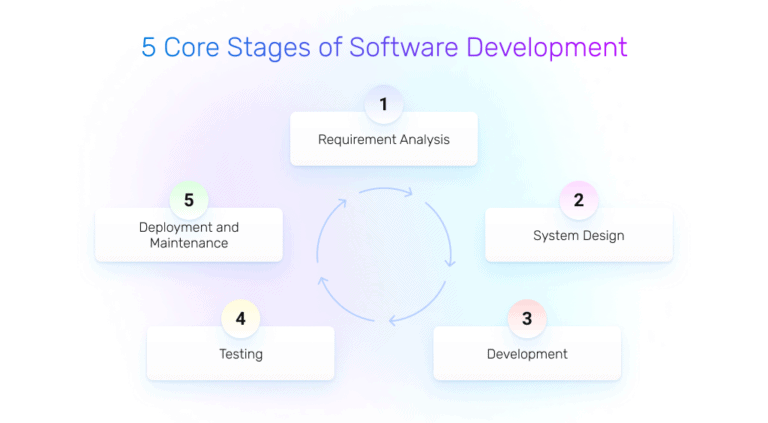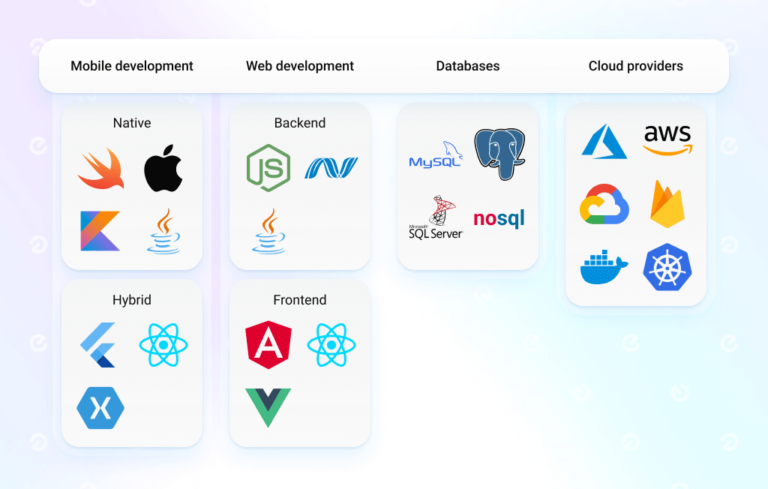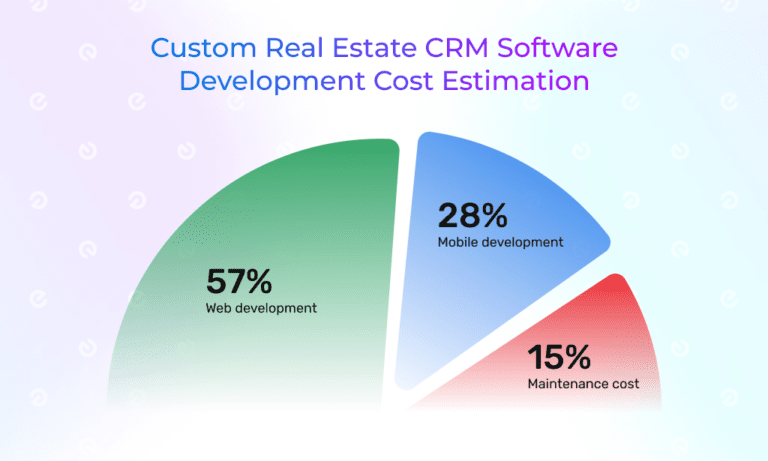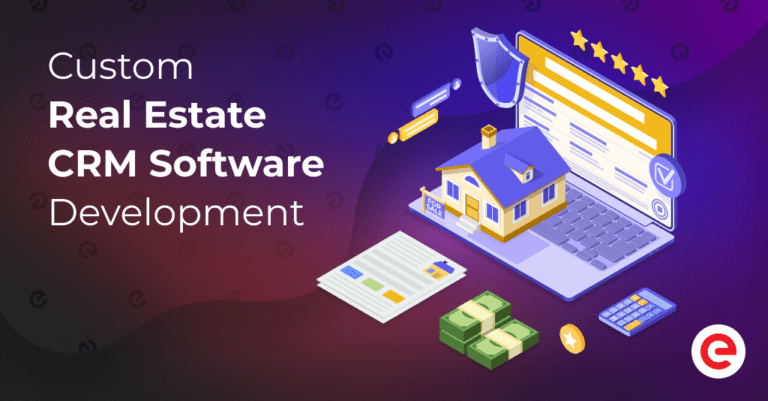
Updated: July 1, 2024
Published: March 11, 2022
How do real estate businesses manage relationships with customers? Why choose custom real estate CRM software development? What core features to include? How to select the right technology stack? How much does custom real estate software cost? Read the article to find answers to these and other related questions.
List of the Content
- What is a CRM in real estate?
- Why choose custom real estate CRM software development
- Custom real estate CRM software features
- Custom real estate CRM system development: use cases
- How to start custom real estate CRM software development
- Custom real estate CRM software development technologies
- Custom real estate CRM software development cost
- In conclusion
WHAT IS A CRM IN REAL ESTATE
Discovering the real estate software market, it’s worth mentioning its considerable growth over recent years. Businesses can find numerous solutions in all shapes and sizes, addressing the needs of multiple users and use cases. The global real estate software market has reached $9.73 billion in 2021, and a CAGR is predicted at 9.7% from 2021 to 2028.
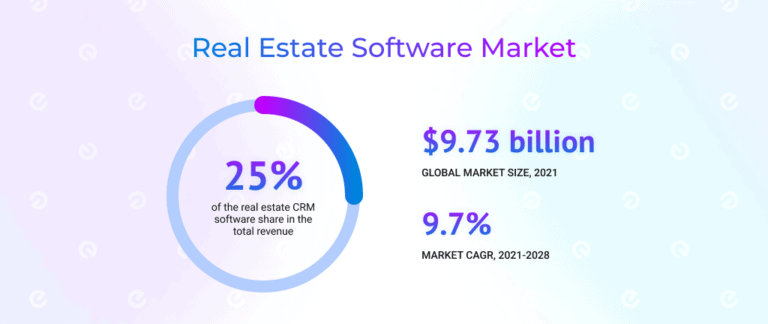
The main objective of any CRM system is automating, managing, and synchronizing communication with customers. The market offers a wide variety of CRMs though the thing is that the real estate CRM solutions are customized to fit the industry-specific needs. It helps the real estate agents manage daily operations and tasks more efficiently and productive. According to the real estate business and income statistics, realtors with a salary of $100 000 and more are more than twice likely to use real estate CRM solutions than agents with a lower income.
The market has presented a great choice for real estate agencies and individual agents. Some of them decide to go with the off-the-shelf software presented by the third-party providers. It is a quick solution to start though it has other important aspects to consider. Firstly, it isn’t always an industry-specific solution; teams can simply choose the known market representatives like Salesforce, Hubspot, Freshsales, etc. Others try to apply ready-to-use solutions like Realvolve, Wise Agent, Propertybase specially built for the real estate businesses. However, the thing still remains that no off-the-shelf solution can cover all the individual business needs. There will always be some aspects that teams might need to abandon, and as it often happens, they pay for functionality that they won’t really use.
Therefore, many teams are ready to start custom real estate CRM software development. It’s all about creating the solution specifically for your business needs. Such distinctive advantages support the opportunity to choose custom real estate CRM software development for personalization, cost-efficiency, security, specific integrations, scalability, etc.
What is a CRM in real estate?
Custom relationship management software helps real estate businesses build and manage customer connections, streamline workflows, handle daily operations and support company growth.
CRM software in real estate plays an important role as it helps stay on top of rising trends. The adoption of tech solutions allows teams to handle regular tasks easier and seamlessly manage the real estate business. Like any other industry, they favor introducing technologies to streamline everyday business operations. The real estate agents, realtors, marketing and sales teams, real estate support staff, administration can find all the required functionality in a one-stop solution. Therefore, we’ve decided to address the question of how to approach custom real estate CRM development and how beneficial it becomes for businesses.
WHY CHOOSE CUSTOM REAL ESTATE CRM SOFTWARE DEVELOPMENT
When real estate teams start looking for the CRM solution, they face the choice of off-the-shelf software vs custom real estate CRM software development. Moreover, the best option can only be chosen when the team carries out a detailed analysis of market offers and defines their unique requirements.
Real estate CRM software development has to cover a variety of functionality and suit the involved parties’ needs. It focuses on bringing better value across all the departments and supporting great relationships with customers. There are some common needs of involved end-users.
- Real estate agents need quick access to the data related to the property and have the means to establish excellent communication with customers.
- The marketing team uses the CRM to generate more leads and evolve the new efficient marketing strategies.
- Real estate sales look for the tools to match the suitable properties to potential costumes, close deals, manage documents, and handle other required transactions.
- Real estate support staff answers customers’ questions, keep them informed on transactions and resolve rising issues
- Real estate administration leverages the CRM to control all the operations, present required policies, get reports and apply analytical approaches.
Therefore, a good decision is to define specific business needs and find the most appropriate solution. It’s always a good idea to check aspects that often become decisive for teams.
Custom real estate CRM software development has definite advantages over purchasing the ready solution regardless of the market software variety.
Customization – It’s an essential aspect for increasing service quality, staff productivity, and customer satisfaction. Custom real estate software development presents optimal solutions to address company-specific needs.
Integration – Even though standard solutions like the calendar or email integrations are included in all CRMs, the business shouldn’t forget other needs. Business operation flows, one-stop database, tech support are simpler to implement with custom real estate CRM software development.
Scalability – The software that can be easily adapted to rising needs is always better for businesses. Custom real estate CRM software development maintains higher scalability and enables continuous advancements.
Security – Any chosen solution has to be compliant with all the latest regulations. Data security for the CRM in real estate is quite essential as it guarantees data consistency across the entire organization. Custom software development is highly secure and enables access control within authenticated and encrypted communications.
Cost-efficiency – At first sight, lower upfront costs for off-the-shelf CRM software are among quite decisive aspects of the final choice. However, teams should consider further expenses on integrations, customization, monthly fees, additional licenses for advanced functionality, etc. Moreover, purchased solutions are usually limited on the number of users. Thus along with the business growth, it becomes harder to cover expenses.
Long-term perspective – Custom real estate CRM software development gives businesses a chance of justifying all the effort and recourses spent on its implementation. Once it’s delivered within the organization, it’s simpler and cheaper to maintain and support according to rising needs. Moreover, the company isn’t that dependent on third-party providers.
CUSTOM REAL ESTATE CRM SOFTWARE FEATURES
Before the team starts custom real estate CRM software development, it’s important to discover the required functionality. Sharing good market practices and introducing new features allows them to fulfill development objectives.
The right set of features provides better opportunities to support software development trends in real estate. Let’s discuss some of the typical functionalities required to support daily operations in this industry.
Contact management
Contact management remains the core feature within any CRM. Custom real estate CRM software development has to deliver the best tools to store and manage customer data. It records all the clients’ data, including contacts’ details, appealing properties, made transactions, etc.
Interaction tracking
Interaction tracking helps to enhance customer engagement. This feature is introduced to review the interaction history with every client and gather records for valuable business insights. It’s about the ability to manage connections from one place, optimize performance, and get clients to close.
Property listing
Property listing management is a must-have functionality to provide customers with the best offers for renting, buying, or selling. Real estate agents need quick access to accurate data on the chosen property. At the same time, advanced filters help sort by applied criteria to find the right property match for the potential customer.
Lead management
The lead management feature defines the entire process to capture, qualify and nurture leads. It allows the team to build individual relationships with potential customers. The primary objective is based on the ability to reduce the manual workload, map the sales process and generate new leads. It also involves supporting campaigns on social media, email marketing, etc.
Contract and transition management
Contract and transaction management is a necessary element to any CRM system. It allows assigned users to regulate business transactions, keep track of minor details, generate contracts, view documents, etc. This functionality aims to ensure compliance and smooth completion of all the transactions.
Invoice and billing management
Invoice and billing management is one of the advanced features for custom real estate CRM software development. Its delivery allows companies to bill clients directly from the CRM system. This tool handles automated billing, faster quotes, payment tracking, and reporting. Besides, it enables the sale closing according to the latest compliance regulations.
Task management
Task management enables organizing workflows and performing daily operations. It automatically adds activities to the timeline and manages tasks across the entire organization. That helps to record all the activities, interactions, and exchanges between customers and departments. Custom real estate CRM software development often involves additional integrations and synchronization with other necessary tools.
Dashboards and reports
Dashboards and reports remain at the core to receive valuable business insights. It’s important to stay at the top of rising needs, understand ongoing business situations, and define future improvements. In addition to gathering required data, custom real estate CRM software development focuses on its analysis for further usage. It enables evolving efficient strategies and bringing the real estate business to a new level.
Deal management
Deal management embraces business growth via strategic planning. This functionality executes deal workflows by gathering required data, establishing strong customer relationships, setting end-user roles, and regulating other required parameters. It can give new approaches to business operations and offered services.
Of course, the feature choice for custom real estate CRM software development might seem a difficult task. However, it’s easily achievable with setting the right priorities, learning your needs, and sharing other good market practices. Moreover, custom software development always has room for further improvements and brings new ideas for implementation.
Are you looking for a professional real estate CRM software development company?
EXISTEK’s team has decade-long experience delivering custom software solutions and knows how to turn your idea into a valuable product.
CUSTOM REAL ESTATE CRM SOFTWARE DEVELOPMENT: USE CASES
Custom real estate CRM systems have become advantageous because they are tailored to specific needs and workflow. This allows for greater efficiency and automation in managing and analyzing customer interactions and improved tracking and reporting capabilities. Additionally, a custom CRM can integrate with other tools and systems a business may already use. It can lead to better data flow and a more seamless user experience.
Custom real estate CRM software development may be necessary when off-the-shelf solutions do not meet the specific needs of a real estate company. For example, a custom solution may be required to handle those tasks effectively if a company has unique business processes or specific data management requirements. Additionally, a custom CRM can provide a competitive advantage by providing advanced tools and features. Let’s consider some of the common use cases to start custom software development.
- A large real estate agency needs a more efficient way to manage its properties and leads. They can work with a software development company to create a custom CRM that includes property management, lead tracking, and marketing automation features. The agencies often report a significant increase in productivity and a better ability to close deals.
- A luxury real estate firm specializing in high-end properties needed a CRM that could handle the unique needs of its clients. They could work with a software development team to create a custom CRM with a VIP client portal, advanced analytics, and integration with their website and social media platforms. The firm can focus on significantly increasing client satisfaction and retention.
- Real estate specialists benefit from a CRM to manage their large portfolio of properties and projects. They might need to create a custom CRM that includes project management, financial tracking, and reporting features. They commonly report a significant increase in efficiency and a better ability to track progress and make decisions.
- A property management company that needed a CRM to handle the complex needs of managing multiple properties and tenants. They need a software development team to create a custom CRM that includes features such as tenant management, lease tracking, and maintenance schedule. The property management company often reports a significant increase in efficiency and better communication with tenants.
- A real estate brokerage firm that needed a CRM to manage its rapidly growing team of agents. They need to develop a custom CRM with such features as agent management, commission tracking, and lead distribution. The brokerage firm reported a significant increase in productivity and a better ability to track the performance of its agents.
- A real estate investment company also needs a CRM to manage its portfolio of properties and investors. They focus on creating a custom CRM to include investment tracking, financial analysis, and investor reporting features. The investment company reported a significant increase in efficiency and a better ability to make informed decisions.
Custom real estate CRM systems offer benefits such as increased efficiency and automation in managing customer interactions, improved tracking and reporting capabilities, and integration with other tools. These benefits can provide a competitive advantage for real estate companies and help them increase productivity and improve customer satisfaction. Companies may choose to develop a custom CRM to meet specific needs, such as managing properties, leads, clients, teams, and investments. Besides, they have the opportunity to both focus on specific features and combine the full set of them.
HOW TO START CUSTOM REAL ESTATE CRM SOFTWARE DEVELOPMENT
Like any other industry, the real estate segment realizes the need to adopt new technologies and digitalize existing approaches. It’s important to follow the latest market trends and deliver an excellent customer experience. The well-established relationships with your clients remain the key factor to business success.
We’ve defined the main functionality within custom real estate CRM software. So let’s discover how to start the development itself. Teams put effort into developing custom solutions as they understand the benefits they can get with it.
As long as the company decides to start custom real estate CRM software development, they need to undergo the following stages.
- Requirement analysis
- Design
- Development
- Testing
- Maintenance and updates
Requirement analysis
The primary stage defines the overall development process. And what’s more, the project’s success definitely depends on its efficient implementation. It’s obvious that the team comes up with a number of important decisions to deliver the final solution. Custom real estate CRM software development provides a chance to gather business-specific requirements and implement the outlined product.
The development process starts with a detailed analysis of company needs and possible solutions to them. The company has to set up a cross-functional team that can address both technical and business requirements. It’s important to document the project specifications, including chosen features, applied tech stack, software architecture, etc. Also, it helps to estimate the development timeline and required resources. This stage finishes with a well-defined plan for further custom real estate CRM software development.
Software design
The next stage focuses on creating software architecture and visualizing the project. As long as the team defines the logic of CRM software and sets user roles, they are ready to start to implement the software design. The designer’s team works on its visualizing. It includes creating wireframes, mockups, and prototypes. That helps to demonstrate the basic idea of custom real estate CRM software and guide the team through further development.
Development and testing
The next stage involves the actual development process, where the team has to deliver the full-fledged product. Developers work on setting a powerful database and scalable backend. Also, they need to build a user-friendly frontend and great user experience. It’s a common practice to divide the development into sprints. That allows the team to check on the progress and make changes if required. Moreover, the development always goes in parallel with the testing. The QA teams ensure that the product complies with the set requirements and detect errors and bugs.
Also, the development stage can vary from project to project. Teams apply different approaches in product delivery. Some start web development, and others can extend it with mobile solutions. Whereas they leverage different technology stacks to suit project-specific needs. As a result, this stage finishes with the product launch when end-users are ready to use it.
Maintenance and updates
After the product launch, the team needs to continue support, maintenance, and updates. It becomes a distinctive advantage in custom real estate CRM software development. Businesses have the possibility to maintain the system on their side and implement necessary changes. Moreover, custom solutions are easier to scale according to rising needs and requirements. They can add new features and manage updates.
How to streamline the software development process?
Learn more about SDLC models for efficient project management and successful product launch.
CUSTOM REAL ESTATE CRM SOFTWARE DEVELOPMENT TECHNOLOGIES
The tech stack plays an important role in implementing custom real estate CRM software development. The technology choice varies depending on the project. The main task is to select the tech stack suitable for outlined solutions. Real estate businesses look for advanced solutions that support scalability, security, and accessibility. So let’s consider some popular technologies used in custom real estate CRM software development.
Web development
Technology advancement has introduced new approaches in building functional software. Web development quickly gained popularity due to speed improvements, business continuity, flexibility, and lower costs. It’s one of the efficient solutions to provide functionality on different platforms. Teams often choose to develop cloud applications instead of separate apps for desktop, iOS, or Android platforms. Web development is faster and easier in both delivery and maintenance. In order to develop cross-platform solutions, teams will choose among various technologies. According to statistics, the largest market share belongs to such representatives:
- Databases: MySQL, PostgreSQL, SQLite, MongoDB, Microsoft SQL Server
- Backend development: Node.js, ASP.NET, RoR, Java, PHP
- Frontend development: Angular, React, Vue.js
The functional and up-to-date tech stack is a distinct advantage for efficient custom real estate CRM software development.
Cloud providers
Software development trends in real estate follow similar market trends, including cloud approaches. Custom real estate software CRM software development often introduces the advanced cloud computing environment. It is a great opportunity to move data, business processes, operations, storage, or databases to the cloud. That eliminates the need to handle the on-premise legacy structure but partner with reliable cloud service providers. They offer a wide range of services for storage, databases, app development, computing, security, analytics, etc. Teams have access to all the necessary tools for custom real estate CRM software development. Besides, providers keep on introducing new products and services constantly. As for the market share, the most popular providers are:
- AWS – 59.11%
- Azure – 32.49%
- Google Cloud – 29.66%
Mobile development
Also, real estate businesses can’t ignore the needs of the field team like realtors, real estate agents, etc. The mobile application can become a good extension to support productivity and accessibility for the team. It can be either the full-fledged mobile version of custom real estate CRM software or have the chosen set of functionalities based on user roles. Mobile solutions allow users to access real-time information from anywhere and anytime. It helps to run the real estate business on the go. As for available technologies, developers can choose based on the required platform and development approaches.
- iOS native development: Objective-C, Swift
- Android native development: Java, Kotlin
- Hybrid mobile development: Flutter, React Native, Xamarin
The great advancement of hybrid frameworks enables faster development at lower costs as the team can deliver the cross-platform app for iOS and Android.
Different integrations
It’s obvious that advanced CRM software won’t stand without different integrations. Along with the adoption of new tech solutions, teams often need to integrate existing business operations and workflows. Custom real estate CRM software development is especially beneficial as the team focuses on specific needs. Integrations are a great opportunity to automate certain business actions and expand functionality. Besides standard integrations like email, calendar, or social media, the real estate software development company can add more advanced functionality. They can cover team communication, calling software, live chat, payment, video, prospecting software, and other integrations. As for industry-specific integrations, it’s important to support IDX (Internet Data Exchange) to generate leads and sales. IDX integrations help access the local MLS (multiple listing services) and other third-party listings. It allows real estate agents to share and access listing details. Moreover, it can securely integrate broker certifications, lead capture, listing services, area profiles, etc.
Need help with choosing a suitable technology stack?
EXISTEK’s team is at your assistance. We have a decade-long experience in building custom software solutions and can help to address your needs.
CUSTOM REAL ESTATE CRM SOFTWARE DEVELOPMENT COST
The development cost estimation is one of the required steps to a successful product launch. It’s important that teams not only define the project needs but know how to balance their resources efficiently. Therefore, project cost estimations are always made at the beginning of the development process.
The cross-functional team takes responsibility for handling both tech and business requirements. They evaluate the needs, prioritize the CRM software functionality, select the tech stack, estimate the timeline. These are just a few of the aspects that influence the final cost of custom real estate CRM software development. So let’s outline some important factors to consider for better estimation.
- CRM system complexity – The more advanced solutions teams develop, the more resources they need. However, it doesn’t mean they are required to abandon numerous features, but it’s all prioritizing the right functionality.
- Tech stack – Starting custom real estate CRM software development is easier and faster with up-to-date approaches. The team could consider different alternatives but definitely check technology pros and cons due to project needs. Also, it’s important to check on the availability of developers proficient in chosen technologies.
- Engagement models – Custom real estate CRM software development cost also depends on the way of engaging with the development team. Setting the in-house team from scratch is quite expensive; therefore, many companies apply for the services of professional companies. The real estate software development company provides full-cycle development services with active engagement on the client’s side.
- Developers’ rates – The project cost estimation has to cover expenses on developers’ salaries. The rates vary depending on their expertise and experience, engagement models, and even location. The development rates in North America and Western Europe could be 2-3 times higher than in other development locations over the globe.
It isn’t that easy to make the estimation for custom real estate CRM software development without well-outlined requirements. The comprehensive analysis of the smallest project details gives the possibility to make accurate cost estimates.
Covering the basic functionality, we’ve calculated the approximate cost of custom real estate CRM. Take into consideration that all estimations are made applying the average development rates and can vary in other locations.
- Web development starts at $120 000.
- Mobile app development that duplicates the same functionality could start at $60 000 for both iOS and Android
- Also, the further maintenance cost is commonly estimated at 15% of the overall development cost.
It’s worth mentioning that custom software development for the real estate industry is proven cost-efficient. Ready-to-use software doesn’t require upfront investments, but further expenses are harder to cover, including payments for license fees, paid advanced functionality, extensive functionality, etc. By choosing the real estate CRM software development, teams have a better chance to focus on the specific needs and manage resources efficiently.
IN CONCLUSION
Real estate companies follow the latest market trends and work on the constant advancement of business operations. Since customer relationship management has always been a vital aspect of this industry, they look for an efficient solution. Custom real estate CRM software development allows teams to implement all required functionality and address industry-specific needs. At the same time, personalization and customization help to get the most out of it.
Have additional questions on need assistance with custom real estate CRM software development?
Feel free to contact EXISTEK. We are a software development company specializing in building custom solutions, and gladly share our experience with you.
Frequently asked questions
What is a CRM in real estate?
Custom relationship management software streamlines connections with customers, improves workflows and operations, helps the real estate business grow. It’s become an all-in-one solution to support customer services in real estate.
What are the benefits of custom real estate CRM software development?
Custom software development brings a number of distinctive advantages. It includes
- Customization
- Integration
- Scalability
- Security
- Cost-efficiency
- Long-term perspectives
What are software development trends in real estate?
Real estate software development follows the same trends as the overall market. Teams focus on leveraging the latest technologies and advanced development approaches. They follow the best market practices in web and mobile development, cloud computing, security, analytics, etc.
How to streamline custom real estate CRM software development?
Careful planning is the key to the success of the overall development. The detailed requirement analysis allows teams to define must-have functionality, choose the right tech stack, estimate timeline and costs, and streamline the delivery process.

